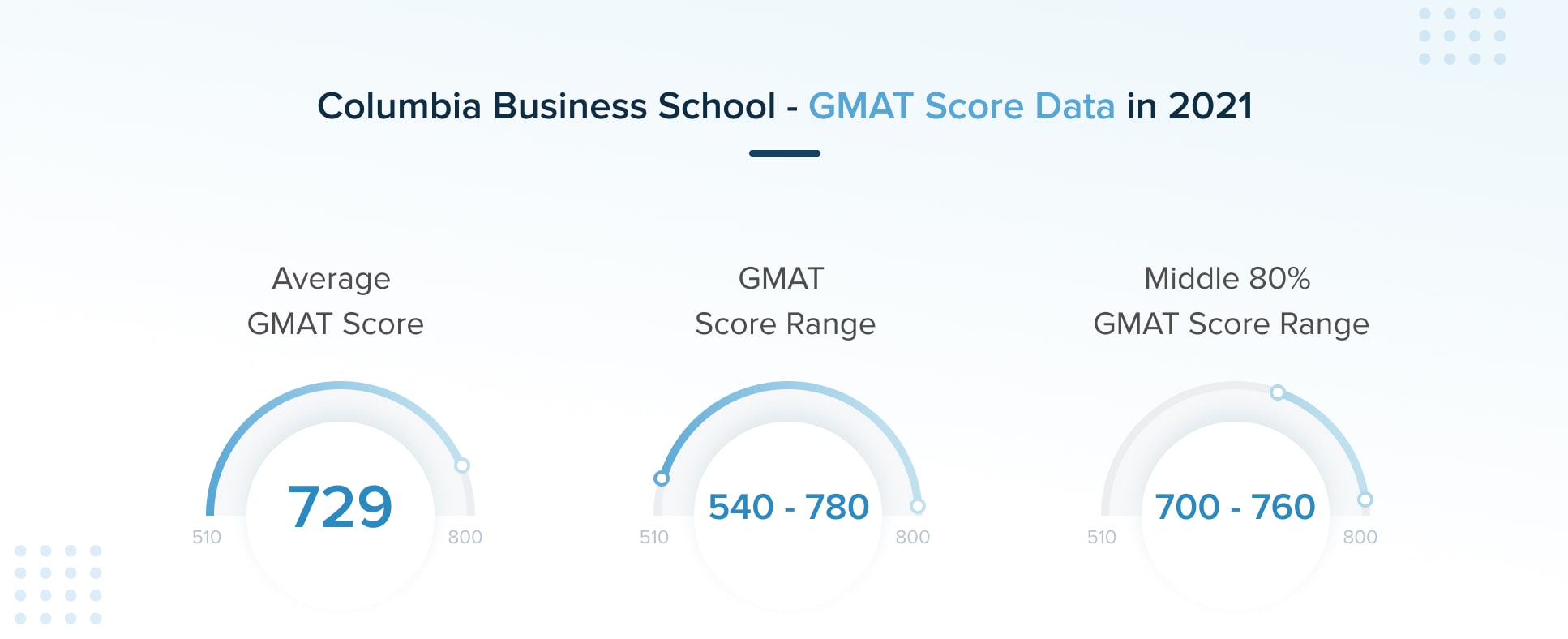-
Target Test Prep 20% Off Flash Sale is on! Code: FLASH20
Redeem
What GMAT Score Do I Need for Columbia University?

MBA admissions at Ivy League schools are notoriously competitive, and admission to Columbia Business School is no exception. So, many prospective MBA students wonder, what GMAT score do I need for Columbia’s MBA program?
In this article, we’ll look at the average GMAT scores of MBA students at Columbia Business School, along with other key aspects of the 2021 incoming class profile. We’ll also discuss the criteria to consider when determining what GMAT score will make you a competitive applicant at Columbia’s full-time MBA program.
To start, let’s look at Columbia’s application requirements as they relate to test scores.
Does Columbia Require a GMAT Score?
For admission to Columbia University’s MBA programs (either the full-time MBA program or the Executive MBA program), all applicants must submit a valid GMAT, GRE, or Executive Assessment score.
So, while a test score is required, it does not necessarily have to be a GMAT score, depending on your situation. If you’re unsure which test to take for MBA admissions, check out our article on whether to take the GMAT or GRE and this comparison of the GMAT and the Executive Assessment.
One thing to keep in mind, regardless of which test you take, is that according to Columbia’s website, you MUST submit your test score by the application deadline. So, just make sure you plan ahead so that any scores you need to send reach the admissions office in time.
So, now that we know that a test score is required for admission to Columbia, this begs the question of whether Columbia requires a particular score.
What Is the GMAT Score Required for Columbia?
In its application requirements, the Columbia MBA program does not specify a certain threshold that your GMAT score must reach for you to gain admittance. In fact, none of the M7 schools state that a minimum GMAT score is required for acceptance.
The thing is, test scores are just one aspect over your overall applicant profile. MBA programs don’t admit students based on any one factor alone. Thus, they tend to admit students who, overall, have a pretty wide range of GMAT scores.
With that in mind, let’s take a look at the Columbia MBA GMAT range and the average GMAT score of the incoming class in 2021.
Columbia MBA GMAT Scores in 2021
Columbia Business School reported the following GMAT score data for its MBA students who were incoming in 2021:

There are a few things to note about the data above. First, 729 is a pretty impressive average GMAT score. However, 729 is right in line with the average GMAT scores reported by other M7 schools. Those scores tend to fall in the 720-730 range.
Second, there is a sizable GMAT score range among accepted students — 240 points! This goes to our earlier point that MBA programs evaluate applicants based on numerous factors. So, a particular test score is not going to be the end all be all that either guarantees or tanks your admission. Perhaps more importantly, this information indicates that what is considered a good GMAT score for one applicant may be very different from what is considered a good score for another applicant.
Given that variability, the GMAT score range of the middle 80% is a useful data point. The middle 80%, or “mid-80%,” as it’s often called, is the score range within which 80% of people in a school’s class scored. In other words, 10% of the class scored above that range and 10% scored below it. So, the mid-80% range tells us what kinds of scores the vast majority of incoming MBA students achieved. Furthermore, this range tells us that admitted students scoring, in Columbia’s case, in the 540-690 range and the 770-780 range were relative outliers.
Thus, the mid-80% range gives applicants a better sense of what score they may need to be on par with most of their competitors.
Of course, who wants to just be “on par” with other applicants? You want to outshine your competitors, not blend into a sea of them, right? There’s also the matter of those outliers; can you shore up your acceptance by aiming for the top 10%? Should you worry if your score falls in the bottom 10%?
To read the complete article, please visit Target Test Prep's blog.
Recent Articles
Archive
- April 2024
- March 2024
- February 2024
- January 2024
- December 2023
- November 2023
- October 2023
- September 2023
- July 2023
- June 2023
- May 2023
- April 2023
- March 2023
- February 2023
- January 2023
- December 2022
- November 2022
- October 2022
- September 2022
- August 2022
- July 2022
- June 2022
- May 2022
- April 2022
- March 2022
- February 2022
- January 2022
- December 2021
- November 2021
- October 2021
- September 2021
- August 2021
- July 2021
- June 2021
- May 2021
- April 2021
- March 2021
- February 2021
- January 2021
- December 2020
- November 2020
- October 2020
- September 2020
- August 2020
- July 2020
- June 2020
- May 2020
- April 2020
- March 2020
- February 2020
- January 2020
- December 2019
- November 2019
- October 2019
- September 2019
- August 2019
- July 2019
- June 2019
- May 2019
- April 2019
- March 2019
- February 2019
- January 2019
- December 2018
- November 2018
- October 2018
- September 2018
- August 2018
- July 2018
- June 2018
- May 2018
- April 2018
- March 2018
- February 2018
- January 2018
- December 2017
- November 2017
- October 2017
- September 2017
- August 2017
- July 2017
- June 2017
- May 2017
- April 2017
- March 2017
- February 2017
- January 2017
- December 2016
- November 2016
- October 2016
- September 2016
- August 2016
- July 2016
- June 2016
- May 2016
- April 2016
- March 2016
- February 2016
- January 2016
- December 2015
- November 2015
- October 2015
- September 2015
- August 2015
- July 2015
- June 2015
- May 2015
- April 2015
- March 2015
- February 2015
- January 2015
- December 2014
- November 2014
- October 2014
- September 2014
- August 2014
- July 2014
- June 2014
- May 2014
- April 2014
- March 2014
- February 2014
- January 2014
- December 2013
- November 2013
- October 2013
- September 2013
- August 2013
- July 2013
- June 2013
- May 2013
- April 2013
- March 2013
- February 2013
- January 2013
- December 2012
- November 2012
- October 2012
- September 2012
- August 2012
- July 2012
- June 2012
- May 2012
- April 2012
- March 2012
- February 2012
- January 2012
- December 2011
- November 2011
- October 2011
- September 2011
- August 2011
- July 2011
- June 2011
- May 2011
- April 2011
- March 2011
- February 2011
- January 2011
- December 2010
- November 2010
- October 2010
- September 2010
- August 2010
- July 2010
- June 2010
- May 2010
- April 2010
- March 2010
- February 2010
- January 2010
- December 2009
- November 2009
- October 2009
- September 2009
- August 2009